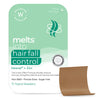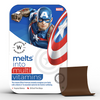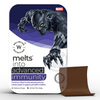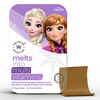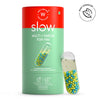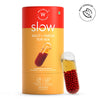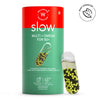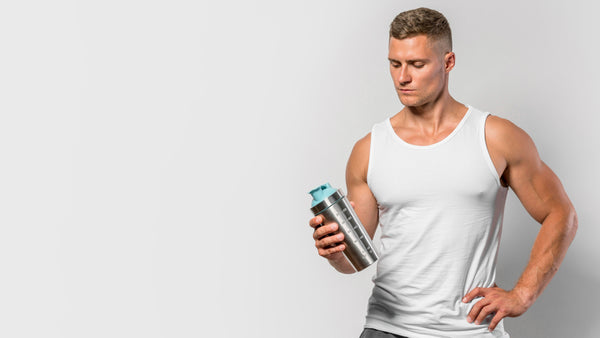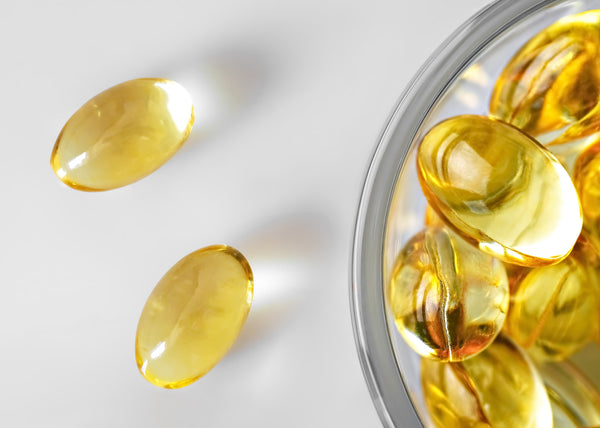We often focus on protein, carbs, and fats when it comes to eating well, but trace minerals like zinc don’t always cross our minds. But in reality, zinc plays a key role in supporting your immunity, wound healing, growth, and even your sense of taste and smell. If you’re looking to naturally strengthen your immune system and overall wellbeing, building a zinc-rich diet is a great place to start.
Let’s break down everything you need to know about this essential mineral, especially if you're looking for vegetarian sources of zinc and easy ways to add them to your daily meals.
Why Your Body Needs Zinc
Zinc is a trace mineral, which means your body needs it in small amounts, but its impact is anything but small. It’s involved in more than 300 enzymatic reactions in your body, from supporting your immune system and metabolism to aiding cell repair and DNA synthesis. Zinc is especially crucial during growth phases such as childhood, adolescence, and pregnancy. [NIH]
It also plays a role in skin health, vision, and brain function. If you find yourself falling sick often, have slow-healing wounds, or struggle with acne or hair fall, a zinc deficiency might be worth exploring.
Your zinc needs vary with age, gender, and life stage. Here’s a quick guide to help you understand your daily zinc requirement:
-
Kids (1–8 years): 3–5 mg/day
-
Tweens & Teens (9–18 years): 8–11 mg/day
-
Adult men: 11 mg/day
-
Adult women: 8 mg/day
-
Pregnancy and lactation: 11–12 mg/day
Vegetarians and vegans may need a little more, as plant-based zinc isn’t always absorbed efficiently due to certain compounds that interfere with absorption.
Signs of Zinc Deficiency
You may not realize your body is low on zinc right away, it’s a subtle deficiency. But over time, your body starts giving signals:
-
Frequent colds and infections
-
Loss of appetite
-
Hair thinning
-
Poor wound healing
-
White spots on nails
-
Skin issues like acne or rashes
-
Reduced sense of taste or smell
If you suspect you might be deficient, consult a healthcare professional. A simple blood test can confirm it, and increasing dietary zinc or adding supplements can help balance your levels.
Best Vegetarian Foods That Are Packed with Zinc
You don’t need to rely on meat or seafood to get your zinc. In fact, there are plenty of zinc-rich foods that are vegetarian and easy to include in everyday meals.
Here are ten excellent plant-based options:
If you’re on a vegetarian or predominantly plant-based diet, the good news is that there are plenty of zinc-rich foods vegetarian options to support your needs. Here are ten great ones to include:
-
Pumpkin Seeds
A small handful (about 30g) provides up to 2.2 mg of zinc. They're also rich in magnesium and healthy fats.
-
Chickpeas
One cup cooked offers about 2.5 mg of zinc. Great in salads, hummus, or curries.
-
Lentils
Cooked lentils give you about 1.3 mg of zinc per cup, along with protein and fiber.
-
Cashews
These delicious nuts offer 1.6 mg of zinc per ounce. They make a great on-the-go snack.
-
Almonds
While lower in zinc than cashews (about 0.9 mg per 28g), they come packed with other benefits.
-
Hemp Seeds
Just 3 tablespoons can provide up to 3 mg of zinc. Sprinkle on salads or smoothies.
-
Quinoa
A cup of cooked quinoa offers about 1.1 mg of zinc. Plus, it’s a complete protein.
-
Tofu
Half a cup of firm tofu can offer 1.8 mg of zinc. Use it in stir-fries or curries.
-
Oats
A cup of cooked oats provides about 2.3 mg of zinc. Add fruits or nut butters for a complete breakfast.
-
Mushrooms
Especially shiitake and cremini mushrooms, which contain up to 1.3 mg of zinc per cooked cup.
Additionally, while zinc in fruits is generally lower compared to seeds or legumes, some fruits like avocados, blackberries, and pomegranates contain small yet beneficial amounts. They work well in supporting your zinc intake when combined with other plant-based sources.
Easy Ways to Add Zinc-Rich Foods to Your Day
Building a zinc-rich diet doesn’t mean overhauling your meals. It’s more about smart additions and mindful pairings. Here are a few easy ideas:
-
Add a spoon of pumpkin seeds or hemp seeds to your smoothies or salads
-
Make a hearty chickpea or lentil curry with whole spices and a squeeze of lime
-
Replace white rice with quinoa or mix oats into your dosa or pancake batter
-
Include a small handful of nuts like almonds or cashews in your mid-morning snack
-
Swap out cream-based spreads with a protein-packed tofu dip or hummus
These small changes can help you consistently meet your daily zinc requirement—without making it feel like a chore.
Helping Your Body Absorb Zinc Better
Here’s the catch: getting zinc through food is only half the story, your body also needs to absorb it. And that can be tricky with plant-based foods, which naturally contain phytates, compounds that can block zinc absorption.
Here's What You Can Do:
-
Soak, sprout, or ferment grains, legumes, and seeds. This helps reduce phytate content and makes zinc more bioavailable.
-
Pair with vitamin C-rich foods like citrus, berries, or bell peppers to boost absorption naturally.
-
Limit excess iron or calcium supplements at the same time as zinc—these minerals can compete for absorption.
-
Cook with aromatics like garlic and onion—surprisingly, they may help with better zinc utilization too.
When Food Isn’t Enough
Life is always busy. Travel, stress, or even digestion issues can sometimes affect how much zinc you absorb. In such situations, high-quality supplements can be a supportive addition.
At Wellbeing Nutrition, you’ll find thoughtfully crafted products that deliver zinc along with key synergistic nutrients like vitamin C, D3, and plant-based antioxidants. Whether you prefer effervescent tablets, slow-release capsules, or oral strips, there’s something designed to fit your lifestyle and improve daily wellness.
To Sum It Up
Zinc might not always be top of mind, but it plays a huge role in keeping your body resilient and functioning well. A zinc-rich diet, especially one focused on whole, plant-based foods, can make a noticeable difference in your immunity, skin, hair, energy, and more.
Stay consistent, pair your foods smartly, and don’t hesitate to bring in supplements if needed. With just a few mindful choices, you’ll be well on your way to stronger immunity and better health, naturally.
FAQs
1. What are the best vegetarian foods rich in zinc?
Top zinc-rich foods vegetarian options include pumpkin seeds, chickpeas, lentils, cashews, almonds, oats, quinoa, tofu, and mushrooms, easy to add to your daily meals.
2. Do fruits contain zinc?
Yes, though zinc in fruits is limited, options like avocados, blackberries, and pomegranates provide small yet beneficial amounts that can support a zinc-rich diet.
3. How much zinc do I need daily?
The daily zinc requirement ranges from 8–11 mg for adults, with higher needs during pregnancy and for vegetarians who may absorb less from plant-based sources.
4. What happens if you don’t get enough zinc?
Low zinc levels can lead to frequent infections, skin issues, poor wound healing, hair fall, and loss of taste, making a zinc-rich diet essential for immunity and health.
5. Which Wellbeing Nutrition products are good sources of zinc?
Wellbeing Nutrition offers supplements with zinc and complementary nutrients like vitamin C and D3, available as oral strips, effervescents, or slow-release capsules, ideal zinc-rich sources when food alone isn’t enough.
6. Does cooking affect the zinc content in food?
Cooking doesn’t significantly reduce zinc levels, but soaking, sprouting, or fermenting foods can improve zinc absorption from vegetarian sources of zinc.








